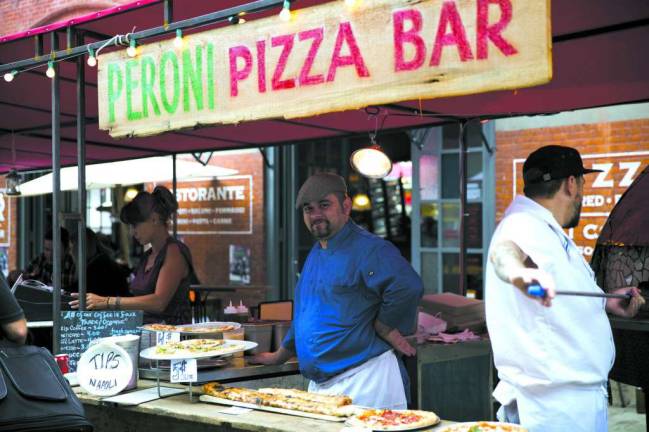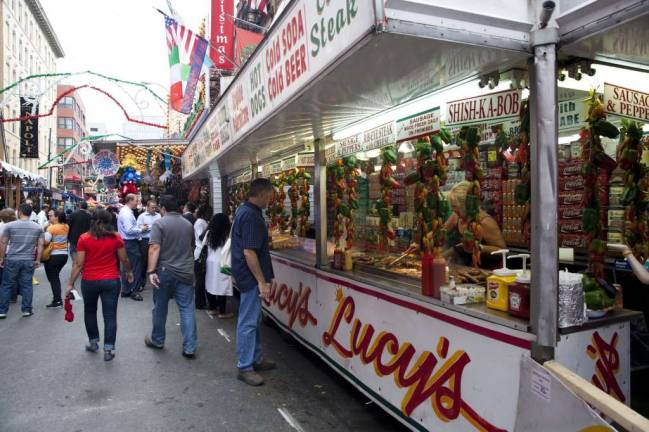Is It Arrivederci to Little Italy?


Rent increases and gentrification have forced the Italians out of their own neighborhood
"Don't forget the cannoli, or the cannoli-sellers!" Italian businesses in Little Italy are pleading.
Cannolis would be hard to miss this week, as Little Italy is once again consumed by the Feast of San Gennaro, the red, white and green-splashed celebration of Italian food and culture that every year takes over the neighborhood.
But after the celebrations and eating contests are over, and the last of the ricotta cream has been put away, Italian businesses in Little Italy are left with the struggle they have been facing for several years now, as gentrification and high real estate values are creeping into the area. Janine Young, a real estate expert at Bond New York, said that rents have increased steadily between 10 and 20 percent in the past couple of years, fueling the exodus of old-line Italians from Little Italy. According to the 2010 census, there are only 28 Italian-born residents living in the neighborhood -- although locals vehemently deny this statistic.
"We're here for the long haul," said Ralph Tramontana, the owner of Sambuca's Café on Mulberry Street, and the president of the Merchant's Association in Little Italy. "This is the only neighborhood that has eight businesses over 100 years old. Sure, Little Italy has gone through its ups and its downs but it's still here."
But despite core businesses like Ferrara Bakery and Di Palo Italian goods store holding on, it's a struggle. This year alone, an unusually high number of Italian businesses - six - have closed in the rapidly shrinking community. That includes La Bella Ferrara Café, which just last year had provided the goodies for the cannoli eating contest at San Gennaro; Il Fornaio, a restaurant that Janine Young raved about; and SPQR, a restaurant on Mulberry between Hester and Grand Street.
Most of the old Italian landlords have left the area, said John Fratta, a community activist, and member of the Petrosino Lodge, the Sons of Italy lodge in the area. He estimates that landlords are asking for anywhere between $35,000-$50,000 per month, depending on the location of the business.
"How much pasta do you gotta sell to make that?" asked Fratta.
SPQR closed in May. The Criscitelli family, who owned SPQR, as well as Da Nico, Pellogrino's and several other restaurants in the area, was forced to close SPQR after they couldn't make ends meet. Nico Criscitelli, who runs Da Nico restaurant, said that they had a $65,000 rent to make every month, in addition to the utilities and electricity.
"The whole neighborhood's upside down," said Nico Criscitelli. "There's no money being made anymore. They threw me out and there's a Christmas shop there now. What are they doing here?"
John Fratta explained that after the Italian businesses and restaurants close, many of them become generic convenience stores and gift shops, filled with novelty items for tourists. The rest of the stores, like Il Fornaio, stay empty for months at a time, because the landlord cannot actually get anyone to move in for $35,000 a month.
But despite businesses struggling, Ralph Tramontana is trying to stay positive. He predicts that in another 10 years, there will be a Little Italy renaissance, especially since Canal Street was cleaned up, and according to Tramontana, Little Italy is one of the few old ethnic neighborhoods left in Manhattan.
"It doesn't matter whether there's 500 Italians here, or 5, it's the buildings that make the history in this place," said Fratta. "You have no idea the amount of people who come through here. The meaning of Little Italy is you preserve the history behind it."
One of the most famous pieces of Little Italy's history is Umberto's Clam House, which has been a neighborhood staple and tourist attraction since 1970. (The restaurant was the site of a notorious mafia murder two years after its opening.) Robert Ianiello explained that he has been in a spat with his landlord recently. Although they came close to closing, Ianiello is in negotiations with his landlord, and is looking to buy the Il Fornaio storefront next door.
"Years ago, your landlord was your friend and your partner. Now he's your boss," said Ianiello. "It's like they're saying 'let's take as much away from the Italians as we can."
Ianiello said that his landlord will not give him a lease, and he is instead living month to month. As a result, he can't look at the future - either to expand to the old Fornaio space, or even to make reservations in his restaurant, because nothing is certain. Three years ago, Umberto's moved to a new location on Mulberry Street, where because of the unstable rents, Ianiello was unable to hire any managers, and has to work 7 days a week to make up for it.
"There's a saying in Little Italy: as Umberto's goes, so does the neighborhood," said Ianiello.